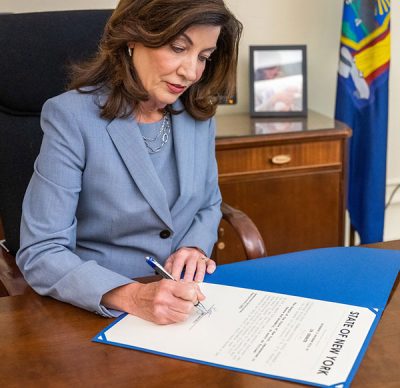Hochul Signs Enhanced Gun Safety Law Following Special Session
News Based on facts, either observed and verified directly by the reporter, or reported and verified from knowledgeable sources.

Gov. Kathy Hochul signed legislation Sunday that bolsters restrictions on concealed weapons, one of two initiatives approved in a special session held last week by the state legislature.
The second action by the legislature amends the state Constitution to guarantee reproductive healthcare for women as well as elevating the rights of millions of residents in regard to their ethnic, LGBTQ or disability status.
The gun measure, which was approved by lawmakers eight days after the U.S. Supreme Court struck down the state’s previous law that required a gun owner to have proper cause to carry a concealed firearm, makes it a crime to carry guns in one of 15 types of locations. Those include public transportation, schools, libraries, playgrounds and other spots where children gather, entertainment venues, bars and restaurants that serve alcohol and houses of worship.
“A week ago, the Supreme Court issued a reckless decision removing century-old limitations on who is allowed to carry concealed weapons in our state – senselessly sending us backward and putting the safety of our residents in jeopardy,” Hochul said in a statement. “Today, we are taking swift and bold action to protect New Yorkers.”
Other key features of the bill enhance safe storage of guns by increasing the age limit so that safe storage laws apply if a minor under the age of 18 lives in the home and ensuring that a person cannot leave a weapon in a car outside of their possession unless the weapon is in a lockbox.
Licensing requirements for concealed carry include an interview with a licensing officer, a minimum of 16 hours of weapons safety training, contact information and character references and a list of social media accounts to confirm character and proper conduct.
Felons and those who have committed certain offenses, such as drunk driving and assault within the past five years, are also disqualified from carrying a concealed weapon.
Assemblyman Chris Burdick (D-Bedford) said amending the state Constitution to protect the rights of women and various classes of people was vital; however, abortion is still legal in New York despite the June 24 U.S. Supreme Court decision to overturn Roe v. Wade. Meanwhile, the lapse of strong gun legislation presented an immediate danger to New York residents.
“I think the urgency is greater with respect to gun safety because a law that we passed that has been very strongly supported by the people of the state of New York has been thrown out,” Burdick said.
State Sen. Peter Harckham (D-Lewisboro) said that in passing both the gun safety legislation as well as codifying abortion in the state Constitution demonstrates that New York “will not be held hostage to ideologues.”
“These are common-sense gun safety regulations that any law-abiding resident will have no problem adhering to,” Harckham said regarding the gun law.
As expected, state Republican Committee Chairman Nick Langworthy slammed the new law, arguing that criminals are leaving fail but those who follow the law are getting penalized.
“This bill is a political charade that makes New Yorkers less safe,” Langworthy said. “Only under the insanity of New York Democrats can you get out of jail free for possessing an illegal firearm, but be targeted by the government for being a law-abiding citizen exercising your constitutional rights.”
The new amendment to the state Constitution, when enacted, will grant protections to women, LGBTQ New Yorkers, and New Yorkers of color, all while protecting the rights of people to practice their religion.
Furthermore, the amendment states that discrimination based on pregnancy, pregnancy outcomes and reproductive healthcare is unconstitutional. The amendment codifies, for the first time, that sex-based discrimination is unconstitutional, therefore protecting marriage equality.
“We are, once again, making certain that all New Yorkers are equal – and will stay equally protected by our laws,” Harckham said.

Examiner Media – Keeping you informed with professionally-reported local news, features, and sports coverage.
